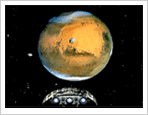Alien Games

PIs: Carrie Heeter, Brian Winn, Rhonda Egidio, Punya
Mishra
ALIEN GAMES will be...
integrated, out of this world fun interactive science learning
and play about extraterrestrials and astrobiology designed to appeal
to high school and middle school girls to interest them in astrobiology,
space science, and game design...
When you see the title “Alien Games,” do images of space aliens
come to mind? That is an immediate connection to our topic—we have
investigated how all-girl and all-boy teams would create a space
learning game if they were in charge of the design elements. We
are, however, using a play on words here and another aspect of “alien” that
we want to emphasize is that females are considered alien, somewhat “other
worldly”/irrelevant, to the culture of producing computer games.
That is a major problem in a reality where children use games to
rehearse and develop skills for adult careers and where games are
created overwhelmingly, by men for boys and men.
Using the motivational fun of play and the intrigue of extra-terrestrial
life forms ALIEN GAMES will engage middle school and high school
students and particularly girls in playing, learning and doing
astrobiology and other planetary systems science.
Commercial games today are “hard fun.” Kids often spend 50 to
60 hours just learning how to play enough to achieve level 2 of
a game. Unfortunately what they learn has no meaning or applicability
beyond the game itself, and perhaps other similar games in the
same genre. But there tends to be no relationship to real life.
In a comparative analysis of commercial and educational games,
Heeter et al. (2003) discovered that educational games are less
fun, take less time to learn and less time to play, and are less
likely to involved reading or typing than commercial games. Educational
games (prior to Alien Games) fail to offer high stake motivations
or opportunities for cooperation or competition.
Scholars studying learning from games are arriving at the realization
that great learning is built into a great game. The game world
and how play occur can have key learning concepts deeply embedded
in their structure. Learning to play and playing both result in
deepening understanding of important concepts and relationships.
It is time for high quality learning to merge with high quality
games. Alien Games will be the next step in the evolution of what
learning games can be.
Based on prior research including the current
NSF-funded Girls as Designers project looking at 5 th and 8 th grader
reactions to and design of learning games ( http://spacepioneers.msu.edu/
), ALIEN GAMES will be compelling, fun, and strongly appealing
to girls, incorporating state of the art learning games bringing
together top astrobiology and planetary system scientists, nationally
known informal science educators, top education scholars, and leading
game design experts.
This project is under development by the Michigan State University
Comm Tech Lab, Mind Games Collaboratory, and College of Education,
Windows on the Universe web site, National Challenger Learning
Center, Space Camp, Chabot Space and Science Center, and Kalamazoo
Valley Museum. Additional partnerships are being established with
top scientists, game development companies, and informal science
education organizations.
For more information and to explore how you
can participate in this project, please contact Project Leader Dr.
Carrie Heeter, Professor of Digital Media Arts and Technology, Michigan
State University in San Francisco, heeter@msu.edu
, 415-681-6473
|

